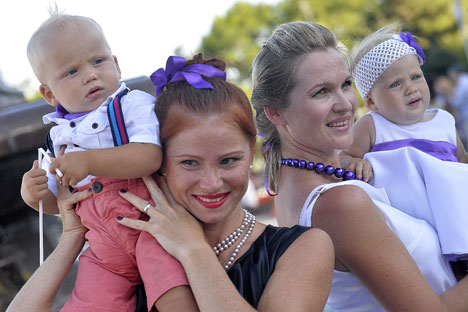Russian support for family programmes

Most Russians consider their primary goal to be to start a family and raise good children. Source: ITAR-TASS
Social policy programmes (including aid and social security benefits) make up a large share of Russia’s budget expenditure. In 2014, around 31% of the spending from both federal and regional budgets (11.9% of the country’s GDP) went to the social welfare sector; excluding healthcare, education, sports and cultural programmes, all of which are considered separate and have separate budgetary outlays.
Social security still represents the bulk of the social welfare expenditure. In 2014, this accounted for 73% of the money that went to social policy. Beyond that, the costs of family and child support programmes have been on the rise since 2010, although this area remains comparatively small, never exceeding 5% of the total expenditure. Of all the areas of spending, family and child support programmes include the highest number of allowances and incentives.
The family support programmes, intended to improve the demographic situation in the country and boost population growth, have begun to prove efficacious. In 2014, the birth rate in the 66 regions which awarded families with three or more children with allowances, have increased by 2.4%.
Besides federal aid (described in the info-graphic), some regional governments have also introduced their own incentives.
In the Moscow region, for example, mothers who give birth to triplets receive an aid package of 150,000 rubles (around $2,400).
The highest one-off payments to families adopting orphans are given in the Sakhalin region. Since 1st January, 2014, they receive 617,000 rubles ($9,870) for each adopted child, a million rubles (around $16,000) if they adopt a child with disabilities.
In the Irkutsk region, families adopting one or more children receive a one-off payment of 100,000 rubles ($1,600). In most other regions, the authorities adhere to the sums given under federal law; 13,741 rubles ($219) for adopting a child, and 105,000 rubles ($1,680) for adopting a child with disabilities.
The most substantial one-off incentive, named the “motherhood capital”, was introduced in 2007. The sum is changed annually, to adjust for inflation. However, there are several restrictions in place to prevent the abuse of these funds. Namely, the incentive is not provided in cash, but as a certificate that can only be used for specific purposes, like the improvement of the family’s living conditions (including a partial repayment of the mortgage, or repairing and expanding one’s house), the education of the child, or social security benefits for the mother.
Federal aid:
Pregnancy allowance — RUB 27,455.5 to 228,603.2 ($437.28 to $3,624.59), depending on the mother’s salary and the duration of her maternity leave
One-off childbirth incentive (for all social groups) - RUB 14,497 ($231.06)
Motherhood capital (for employed women) – RUB 453,026 ($7,218.57), awarded after the birth of the second or subsequent child
Monthly childcare allowance for children up to 18 months old – RUB 2718 to 19,855 ($43.32 to $316.45)
Monthly childcare allowance for single mothers – RUB 2500 to 4500 ($39.79 to $71.69), paid until the child is 16 or 18 years old, depending on the mother’s revenue
For large families (three or more children)
Monthly childcare allowance for the third or subsequent child up to three years old – RUB 6432 to 16,253 ($102.38 to $258.71)
School uniforms for free
A 30% utility discount
A free travel pass
A free plot of land
The Order of Parental Glory with a 100,000 rubles ($1,600) cash prize (contest-based)
All rights reserved by Rossiyskaya Gazeta.
Subscribe
to our newsletter!
Get the week's best stories straight to your inbox